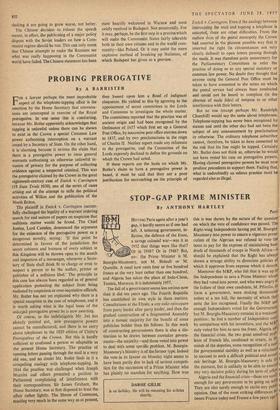PROBING PREROGATIVE
By A BARRISTER FOR a lawyer perhaps the most improbable aspect of the telephone-tapping affair is the assertion by the Home Secretary that conversa- tions are intercepted in exercise of the Royal prerogative. In one sense this is comforting, because Mr. Butler apparently acknowledges that tapping is unlawful unless there can be shown to exist in the Crown a special Common Law power authorising interception on a warrant issued by a Secretary of State. On the other hand, it is 'alarming because it revives the claim that there is a prerogative power to issue general warrants authorising an otherwise unlawful in- vasion of privacy for the purpose of collecting evidence against a suspected criminal. This was the prerogative claimed by the Crown in the great eighteenth-century case of Entick v. Carrington (19 State Trials 1030), one of the series of cases arising out of the attempt to stifle the political activities of Wilkes and the publication of the North Briton.
The plaintiff in Entick v. Carrington success- fully challenged the legality of a warrant ordering search for and seizure of papers on suspicion that seditious matter would be found. The Chief Justice, Lord Camden, denounced the argument for the existence of the prerogative power as a dangerous novelty, saying : 'If this point be determined in favour of the jurisdiction the secret cabinets and bureaus of every subject in this Kingdom will be thrown open to the search and inspection of a messenger, whenever a Secre- tary of State shall think fit to charge or even to suspect a person to be the author, printer or publisher of a seditious libel.' The principle in this case has always been regarded as of general application protecting the subject from being molested by suspicious or over-inquisitive officials.
Mr. Butler has not yet explained why there is a special exception in the case of telephones, and it is worth asking what is the legal basis of the enlarged prerogative power he is now asserting.
Of course, as the indefatigable Mr. Iwi has already pointed out, new prerogative powers cannot be manufactured, and there is no entry about telephones in the 1820 edition of Chitty's Prerogatives of the Crown. But this is hardly sufficient to confound a person so adaptable as the present Home Secretary. The practice of opening letters passing through the mail is a very old one, and no doubt Mr. Butler finds in it a compelling analogy with telephone-tapping. In 1844 the practice was challenged when Joseph Mazzini and others presented a petition to Parliament complaining of interference with their correspondence. Sir James Graham, the Home Secretary, was at first disposed to treat the affair rather lightly. The House of Commons, reacting very much in the same way as at present, then loosed upon him a flood of indignant eloquence. He yielded to this by agreeing to the appointment of secret committees in the Lords and Commons to investigate the whole matter. The committees reported that the practice was of ancient origin and had been recognised by the Ordinance of 1657 which first set up a General Post Office, by successive post office statutes down to 1837, and by two proclamations in the reign of Charles II. Neither report made any reference to the prerogative, and the Committee of the Lords expressly declined to define the grounds on which the Crown had acted.
If these reports are the basis on which Mr.. Butler's claim to have a prerogative power is based, it must be said that they are a poor justification for encroaching on the principle of Entick v. Carrington. Even if the analogy between intercepting the mail and tapping a telephone is accepted, there are other difficulties. From the earliest days of the postal monopoly the Crown had asserted in the plainest possible way that it reserved the right (in circumstances not very clearly defined) to open letters passing through the mails. It was therefore quite unnecessary for the Parliamentary Committees to refer the practice of doing so to any special statutory or common law power. No doubt they thought that anyone using the General Post Office must be taken to have consented to the terms on which the postal, service had always been conducted and could not be heard to complain (in the absence of rnala fides) of trespass to or other interference with their letters.
But no one (except perhaps Mr. Randolph Churchill) would say the same about telephones. Telephone-tapping has never been recognised by statute and until the other day had not been the subject of any announcement by proclamation Or otherwise. The ordinary telephone subscriber cannot, therefore, be taken to have consented to I the risk that his line might be tapped. Certainly Mr. Butler does not think so, otherwise he would not have rested his case on prerogative powers. Having claimed prerogative powers he must now produce precedents to support them. Failing that, what is undoubtedly an odious practice must be regarded also as illegal.


































 Previous page
Previous page